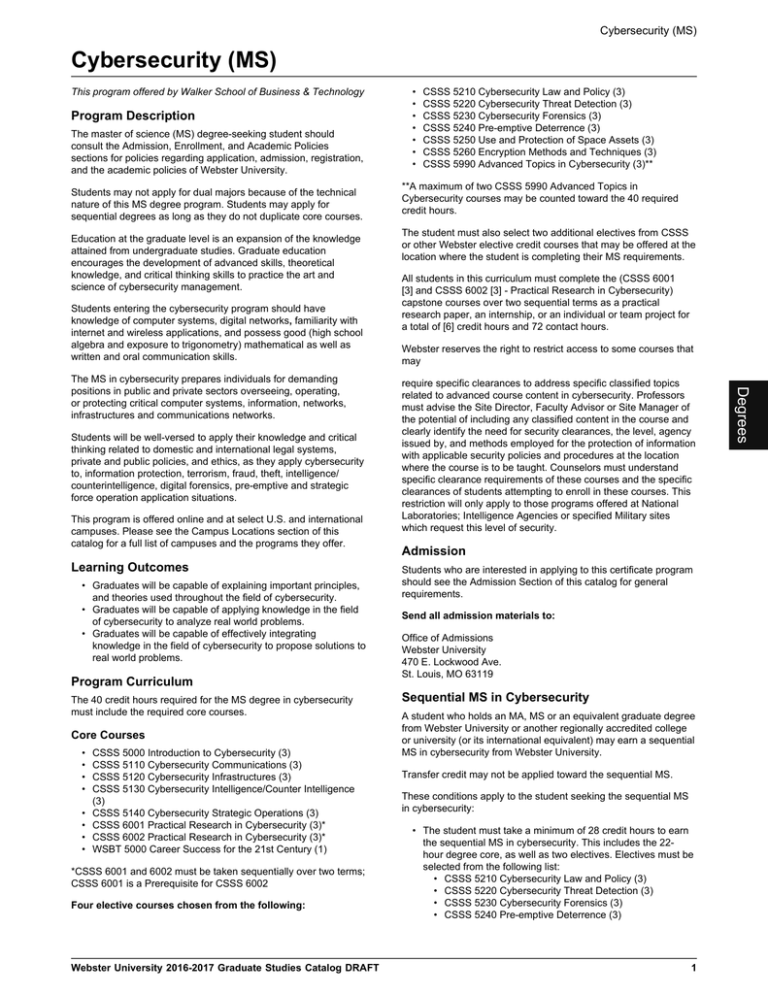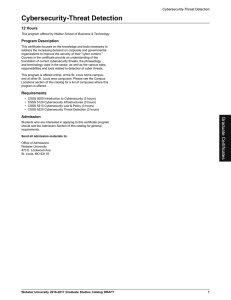Cybersecurity (MS) Program Description
advertisement

Cybersecurity (MS) Cybersecurity (MS) This program offered by Walker School of Business & Technology Program Description The master of science (MS) degree-seeking student should consult the Admission, Enrollment, and Academic Policies sections for policies regarding application, admission, registration, and the academic policies of Webster University. Students may not apply for dual majors because of the technical nature of this MS degree program. Students may apply for sequential degrees as long as they do not duplicate core courses. Education at the graduate level is an expansion of the knowledge attained from undergraduate studies. Graduate education encourages the development of advanced skills, theoretical knowledge, and critical thinking skills to practice the art and science of cybersecurity management. Students entering the cybersecurity program should have knowledge of computer systems, digital networks, familiarity with internet and wireless applications, and possess good (high school algebra and exposure to trigonometry) mathematical as well as written and oral communication skills. Students will be well-versed to apply their knowledge and critical thinking related to domestic and international legal systems, private and public policies, and ethics, as they apply cybersecurity to, information protection, terrorism, fraud, theft, intelligence/ counterintelligence, digital forensics, pre-emptive and strategic force operation application situations. This program is offered online and at select U.S. and international campuses. Please see the Campus Locations section of this catalog for a full list of campuses and the programs they offer. Learning Outcomes • Graduates will be capable of explaining important principles, and theories used throughout the field of cybersecurity. • Graduates will be capable of applying knowledge in the field of cybersecurity to analyze real world problems. • Graduates will be capable of effectively integrating knowledge in the field of cybersecurity to propose solutions to real world problems. Program Curriculum The 40 credit hours required for the MS degree in cybersecurity must include the required core courses. Core Courses • • • • • • • • CSSS 5000 Introduction to Cybersecurity (3) CSSS 5110 Cybersecurity Communications (3) CSSS 5120 Cybersecurity Infrastructures (3) CSSS 5130 Cybersecurity Intelligence/Counter Intelligence (3) CSSS 5140 Cybersecurity Strategic Operations (3) CSSS 6001 Practical Research in Cybersecurity (3)* CSSS 6002 Practical Research in Cybersecurity (3)* WSBT 5000 Career Success for the 21st Century (1) *CSSS 6001 and 6002 must be taken sequentially over two terms; CSSS 6001 is a Prerequisite for CSSS 6002 Four elective courses chosen from the following: Webster University 2016-2017 Graduate Studies Catalog DRAFT CSSS 5210 Cybersecurity Law and Policy (3) CSSS 5220 Cybersecurity Threat Detection (3) CSSS 5230 Cybersecurity Forensics (3) CSSS 5240 Pre-emptive Deterrence (3) CSSS 5250 Use and Protection of Space Assets (3) CSSS 5260 Encryption Methods and Techniques (3) CSSS 5990 Advanced Topics in Cybersecurity (3)** **A maximum of two CSSS 5990 Advanced Topics in Cybersecurity courses may be counted toward the 40 required credit hours. The student must also select two additional electives from CSSS or other Webster elective credit courses that may be offered at the location where the student is completing their MS requirements. All students in this curriculum must complete the (CSSS 6001 [3] and CSSS 6002 [3] - Practical Research in Cybersecurity) capstone courses over two sequential terms as a practical research paper, an internship, or an individual or team project for a total of [6] credit hours and 72 contact hours. Webster reserves the right to restrict access to some courses that may require specific clearances to address specific classified topics related to advanced course content in cybersecurity. Professors must advise the Site Director, Faculty Advisor or Site Manager of the potential of including any classified content in the course and clearly identify the need for security clearances, the level, agency issued by, and methods employed for the protection of information with applicable security policies and procedures at the location where the course is to be taught. Counselors must understand specific clearance requirements of these courses and the specific clearances of students attempting to enroll in these courses. This restriction will only apply to those programs offered at National Laboratories; Intelligence Agencies or specified Military sites which request this level of security. Admission Students who are interested in applying to this certificate program should see the Admission Section of this catalog for general requirements. Send all admission materials to: Office of Admissions Webster University 470 E. Lockwood Ave. St. Louis, MO 63119 Sequential MS in Cybersecurity A student who holds an MA, MS or an equivalent graduate degree from Webster University or another regionally accredited college or university (or its international equivalent) may earn a sequential MS in cybersecurity from Webster University. Transfer credit may not be applied toward the sequential MS. These conditions apply to the student seeking the sequential MS in cybersecurity: • The student must take a minimum of 28 credit hours to earn the sequential MS in cybersecurity. This includes the 22hour degree core, as well as two electives. Electives must be selected from the following list: • CSSS 5210 Cybersecurity Law and Policy (3) • CSSS 5220 Cybersecurity Threat Detection (3) • CSSS 5230 Cybersecurity Forensics (3) • CSSS 5240 Pre-emptive Deterrence (3) 1 Degrees The MS in cybersecurity prepares individuals for demanding positions in public and private sectors overseeing, operating, or protecting critical computer systems, information, networks, infrastructures and communications networks. • • • • • • • Cybersecurity (MS) Cybersecurity (MS) • CSSS 5250 Use and Protection of Space Assets (3) • CSSS 5260 Encryption Methods and Techniques (3) • CSSS 5990 Advanced Topics in Cybersecurity (3) • The student must meet the core course requirements of the MS in cybersecurity. If the student enrolled in any of the core courses as electives in his or her MA, MS or an equivalent degree program, those courses must be replaced with applicable CSSS electives (see list above). • Advancement to Candidacy for sequential MS in cybersecurity: • Sequential MS in cybersecurity students who received the MA, MBA, or MS from Webster University will be advanced to candidacy with initial registration. • A student who received the master's degree from another regionally accredited institution will be advanced to candidacy upon approval of the master's degree transcript. 2 Webster University 2016-2017 Graduate Studies Catalog DRAFT

